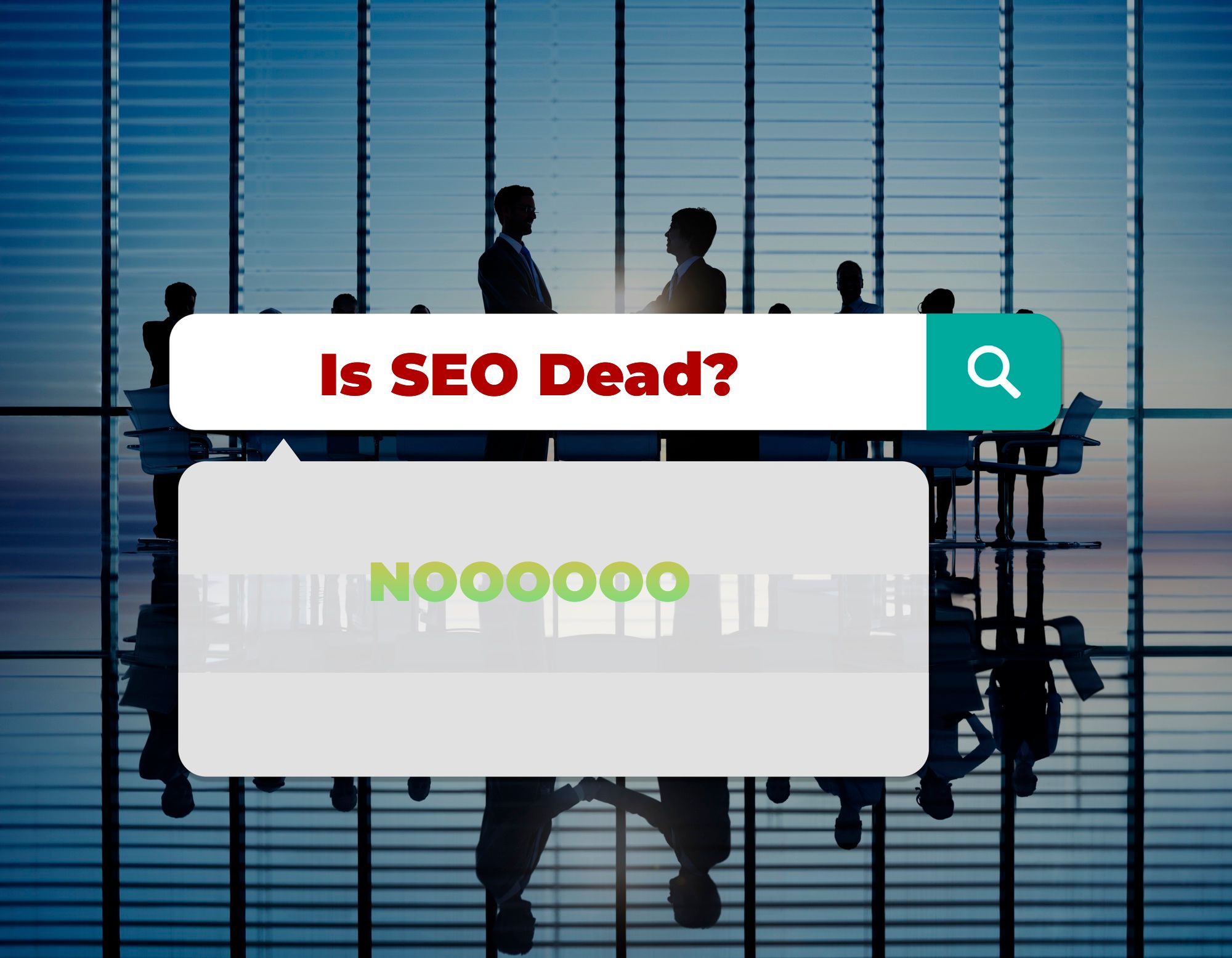No, SEO (Search Engine Optimization) is not dead. In fact, it continues to be a crucial aspect of digital marketing and driving organic traffic to websites. While the landscape of SEO has evolved over time, it remains an effective strategy for improving search engine rankings, increasing visibility, and attracting relevant organic traffic.
Here are a few reasons why SEO is still very much alive and important:
Search engines are still vital: Search engines like Google are the primary means through which people discover information, products, and services online. SEO helps websites optimize their content and structure to appear prominently in search engine results pages (SERPs), driving organic traffic.
User intent and relevance matter: SEO focuses on understanding user intent and delivering relevant content. By aligning your website with what users are searching for, you can attract targeted traffic and provide a valuable user experience.
Organic traffic is valuable: Organic traffic refers to visitors who find your website through unpaid search engine results. It is a highly desirable traffic source as it often indicates strong user intent and can lead to higher conversion rates compared to other channels.
Technical optimization is crucial: SEO involves optimizing technical aspects of a website, such as site speed, mobile-friendliness, crawlability, and indexability. These technical optimizations ensure that search engines can effectively crawl and understand your website, leading to improved rankings.
Content quality and relevance: Creating high-quality, informative, and relevant content remains a fundamental aspect of SEO. Valuable content not only helps improve search rankings but also engages users, encourages link building, and enhances your website’s overall authority and reputation.
Local SEO and voice search: With the increasing prevalence of mobile devices and voice assistants, local SEO and voice search optimization have become important. Businesses can benefit from optimizing their online presence for local searches and voice queries, improving their chances of being discovered by relevant users.
While SEO practices and techniques may evolve as search engine algorithms change, the core principles of optimizing for user experience, relevance, and authority remain central. SEO continues to play a vital role in driving organic traffic and ensuring the long-term success of websites and online businesses.
Here are some facts that highlight why SEO (Search Engine Optimization) is not dead in 2023:
Dominance of search engines: Search engines like Google continue to be the primary source of online information and discovery for billions of users worldwide. Optimizing your website for search engines through SEO ensures that you can capture organic traffic from these platforms.
Organic search drives significant traffic: Studies consistently show that organic search drives a substantial portion of website traffic. In fact, organic search often surpasses other channels like social media and paid advertising in terms of driving targeted and high-converting traffic.
SEO adapts to algorithm changes: Search engine algorithms evolve to provide users with the most relevant and valuable results. While algorithm updates may impact rankings, SEO professionals adapt their strategies to meet the new requirements, ensuring websites can maintain or improve their visibility.
Focus on user experience: Search engines prioritize user experience and satisfaction. SEO involves optimizing websites to provide a seamless and engaging user experience, such as fast page loading, mobile responsiveness, intuitive navigation, and high-quality content. These factors not only improve search rankings but also enhance the overall user experience.
Local and voice search optimization: With the rise of mobile devices and voice assistants, local SEO and voice search optimization have gained prominence. Businesses can benefit from targeting local search queries and optimizing for voice searches, expanding their visibility and reach.
Content is still king: High-quality and relevant content is a cornerstone of SEO. By producing valuable content that aligns with user intent and satisfies search queries, websites can attract organic traffic, earn backlinks, and establish themselves as authoritative sources in their respective fields.
SEO complements other marketing channels: SEO works in conjunction with other marketing channels, such as social media, content marketing, and paid advertising. By integrating SEO strategies into a comprehensive marketing plan, businesses can enhance their overall online presence and drive more targeted traffic.
Long-term investment: SEO is a long-term strategy that builds sustainable organic traffic over time. While paid advertising ceases to generate traffic once the allocated budget runs out, the benefits of SEO persist as efforts invested in optimizing a website continue to generate organic traffic and enhance visibility over the long term.
These facts demonstrate that SEO remains a critical and effective strategy for driving organic traffic, increasing visibility, and maintaining a competitive online presence. It requires adaptability, ongoing efforts, and a focus on providing value to users in order to achieve long-term success.
In short, SEO is not dead because it remains a vital strategy for driving organic traffic, enhancing visibility, and ensuring online success. It adapts to algorithm changes, focuses on user experience, generates significant organic traffic, and complements other marketing channels. With its long-term impact and ability to adapt, SEO continues to be a crucial element in the digital marketing landscape.
Must Read: How to Trend a Post on LinkedIn?
Here are some frequently asked questions (FAQs) on why SEO isn’t dead:
Q1: Is SEO still relevant in today’s digital landscape?
A: Absolutely. SEO remains highly relevant as search engines continue to be the primary way people discover information online. Optimizing websites for search engines helps businesses increase visibility, drive organic traffic, and stay competitive.
Q2: With the rise of paid advertising, why invest in SEO?
A: While paid advertising can yield immediate results, SEO offers long-term benefits. Unlike paid campaigns that stop when the budget runs out, SEO efforts continue to generate organic traffic and visibility, making it a valuable investment over time.
Q3: Do search engine algorithm updates render SEO ineffective?
A: Algorithm updates are designed to improve search results’ relevance and quality. While they may impact rankings, SEO professionals adapt their strategies to align with the new requirements. SEO remains effective by focusing on user experience, quality content, and technical optimizations.
Q4: How does SEO contribute to user experience?
A: SEO and user experience are closely intertwined. By optimizing website speed, mobile-friendliness, navigation, and content relevance, SEO improves the overall user experience. This leads to increased engagement, lower bounce rates, and better search engine rankings.
Q5: Is SEO still necessary with the rise of social media marketing?
A: Social media marketing and SEO are complementary strategies. While social media can drive traffic and engagement, SEO targets search engine visibility. By optimizing websites for search engines, businesses can attract organic traffic and maintain a strong online presence.
Q6: Does the dominance of voice search impact the importance of SEO?
A: Voice search is gaining popularity, but it reinforces the significance of SEO. Optimizing for voice search queries, local SEO, and mobile-friendly experiences helps websites rank higher and capture voice-driven search traffic, ensuring relevance and visibility in this evolving landscape.
Q7: Can SEO generate substantial organic traffic?
A: Yes, SEO can generate significant organic traffic. By optimizing websites for relevant keywords, creating high-quality content, and earning authoritative backlinks, businesses can attract targeted organic traffic that often leads to higher conversion rates compared to other channels.
Q8: Is SEO only beneficial for large businesses?
A: SEO benefits businesses of all sizes. While larger companies may have more resources, small and medium-sized businesses can still optimize their websites and compete effectively in search engine rankings. SEO levels the playing field and allows businesses to reach their target audience online.
Q9: Is SEO a one-time effort or an ongoing process?
A: SEO is an ongoing process. Search engines continually update their algorithms, and competitors are constantly optimizing their websites. To maintain and improve search rankings, businesses must consistently monitor performance, adapt strategies, and refine their SEO efforts.
Q10: How long does it take to see results from SEO?
A: SEO is a long-term strategy, and results may vary depending on various factors, such as website age, competition, and targeted keywords. While some improvements can be seen in a few months, significant results often take several months to a year or more, emphasizing the importance of patience and persistence.
These FAQs address common concerns and highlight why SEO remains a relevant and effective strategy for businesses aiming to increase online visibility, attract organic traffic, and achieve long-term success in the digital landscape.
Must Read: What Makes Instagram Stories So Addictive?





